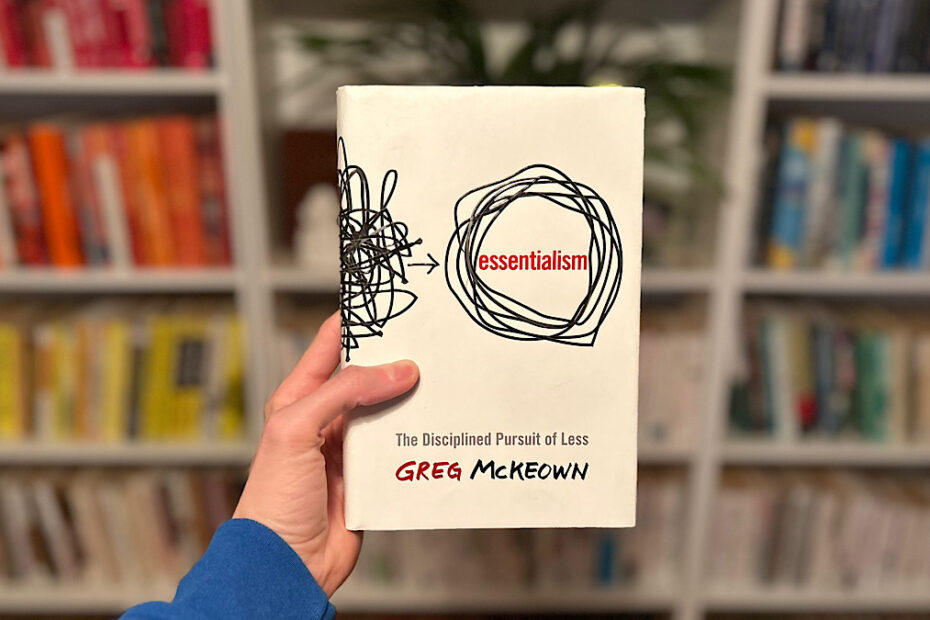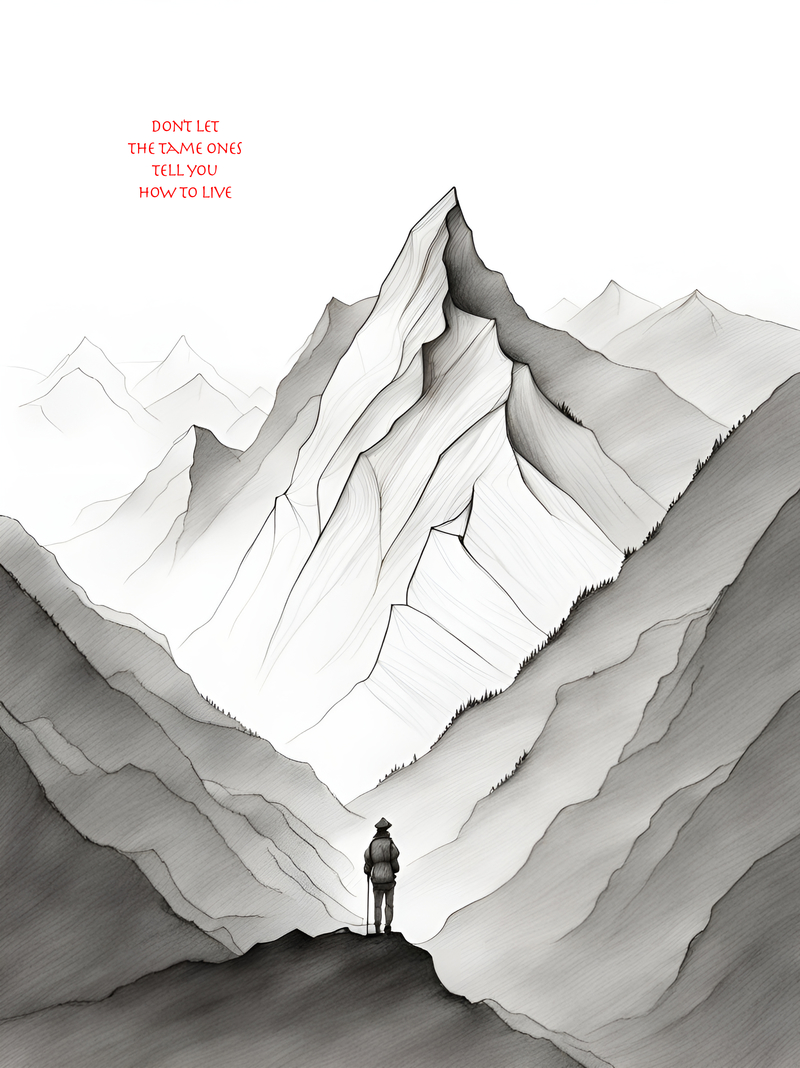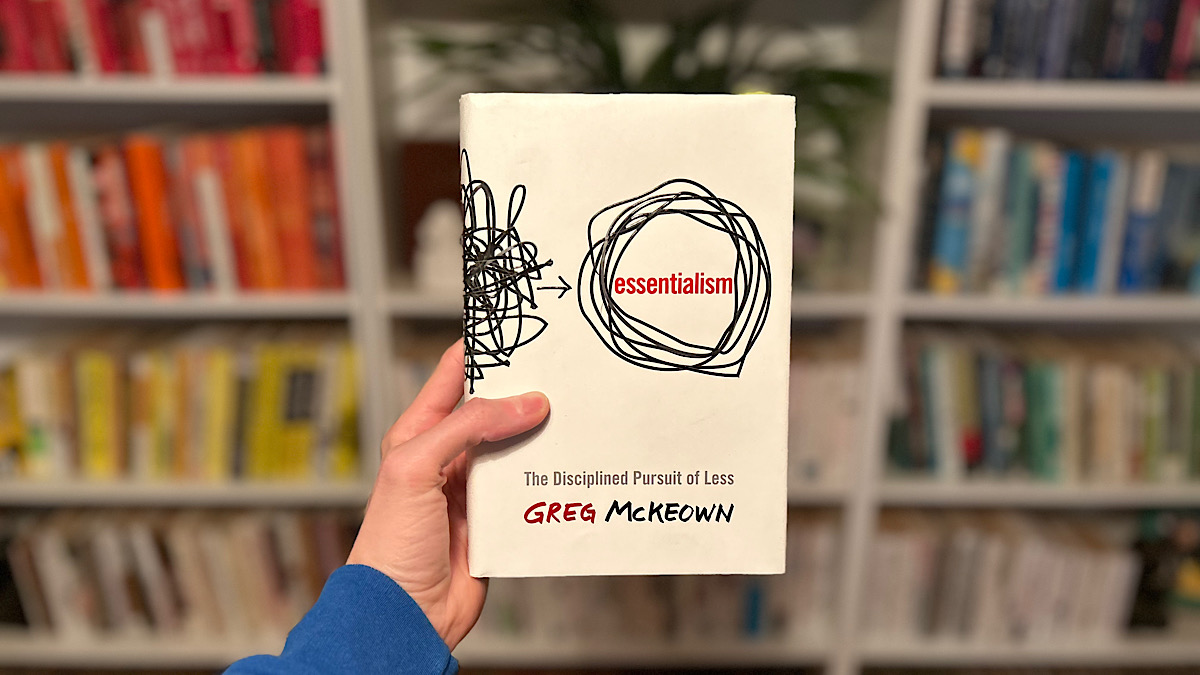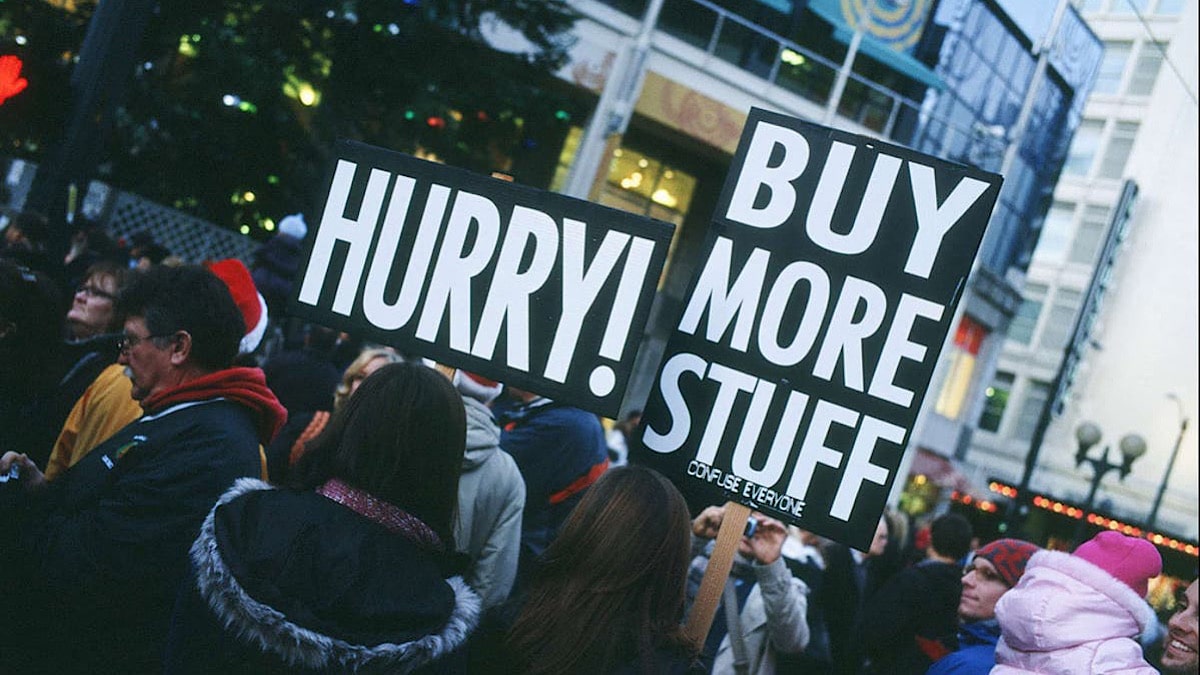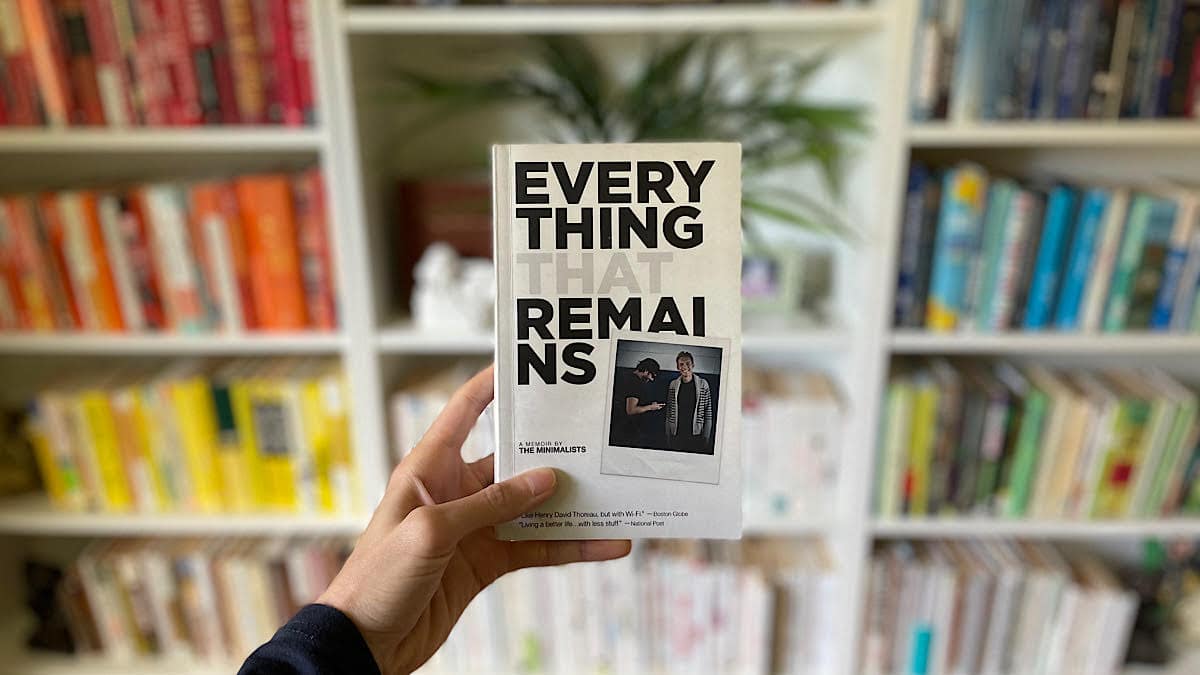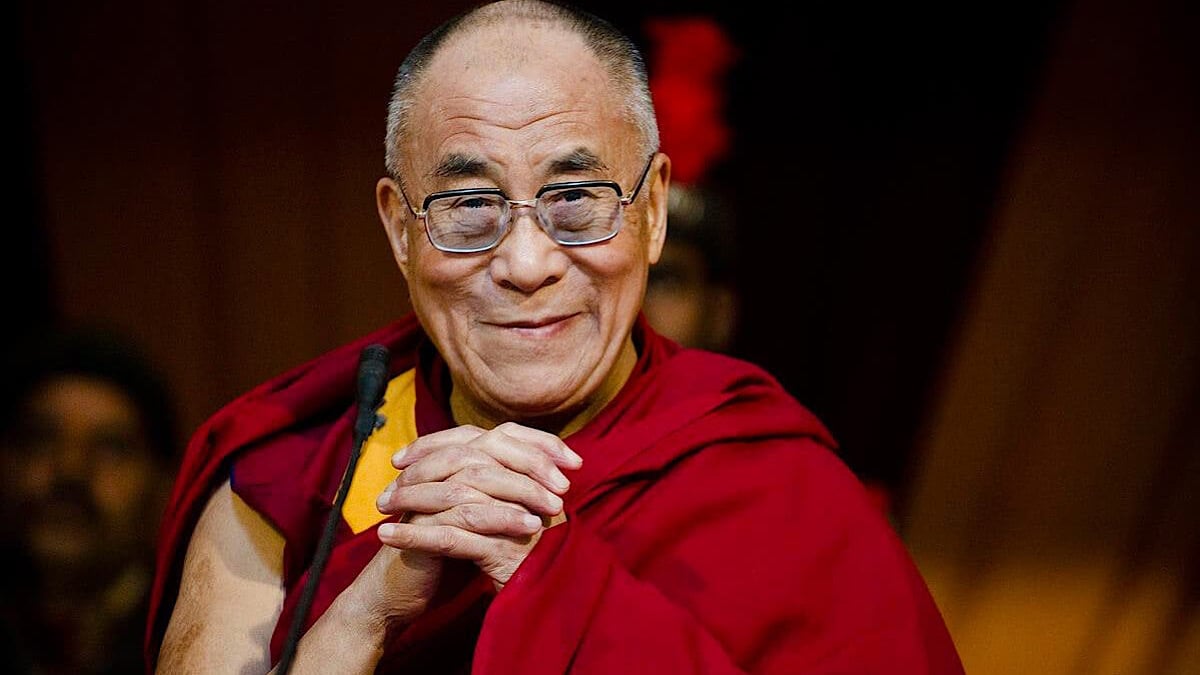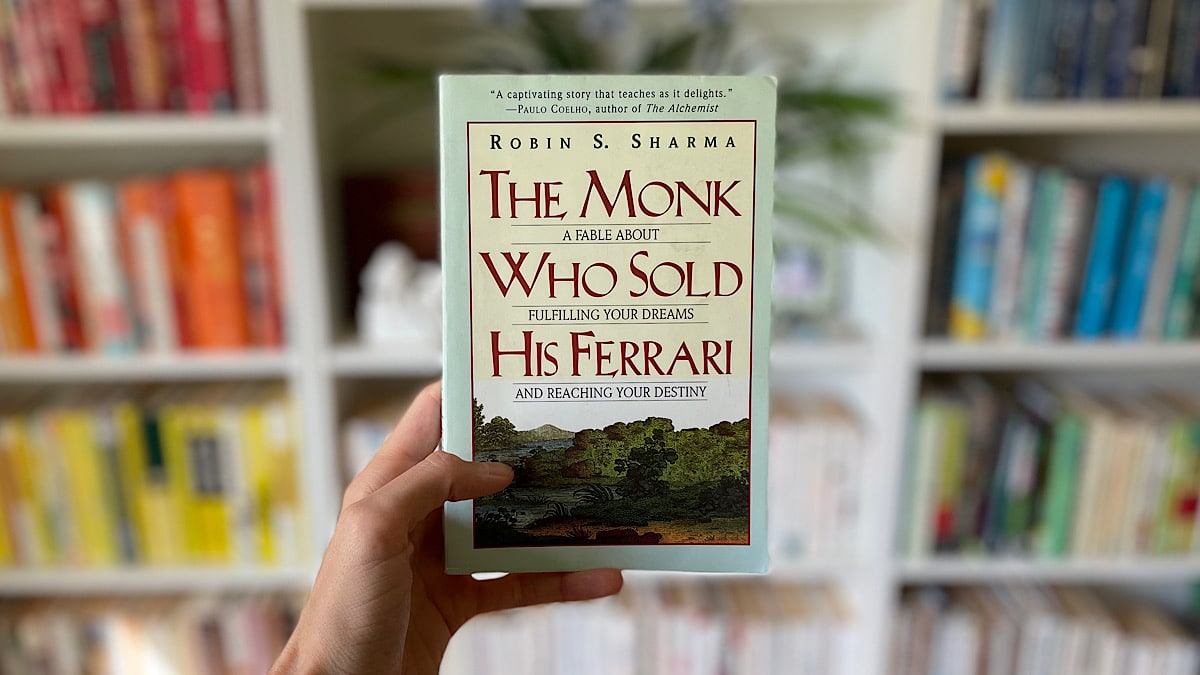Excerpt: These quotes from Essentialism present a hard-to-argue-with case for a better life via less. Maybe “more” isn’t what we need more of after all…
Click here to jump right to our list of quotes from Essentialism!
Introduction: Better via Less in Martial Arts
In Martial Arts, one of the goals is to learn how to maximize the creation of power while minimizing the expenditure of energy.
Essentially, it’s the practice of learning how to fully press the “gas pedal” while fully releasing the “brake pedal.”
Pressing the gas and brake pedal at the same time is wildly inefficient for driving—and so is it for moving the body. Yet, this is the default when it comes to moving the body with any degree of intensity.
Both the protagonist and antagonist muscle groups tense which, in effect, slows down the attempt to speed up all at once.
…And wastes a bunch of energy in the process.
The art then becomes learning how to selectively tense certain muscles while selectively relaxing others in real time. And the challenge, of course, is that there isn’t only one gas and one brake pedal—there are hundreds.
And so it is for life.
NEW In The Shop: Don’t Let The Tame Ones Tell You How To Live [Poster]
Why We ♥ It: Some of the best advice I (Matt here) ever got was: don’t take life advice from people who aren’t living a life you want to live and don’t take criticism from people you wouldn’t go to for advice. I created this poster to act as a reminder to listen more closely to our role models and less closely to our critics, trolls, and tamed-comfort-zone-hugger acquaintances. It’s also a perfect gift for the outdoor adventurer, travel enthusiast, or solo explorer (or soon to be). Available in print or digital download. 👇🏼
...Want to advertise your book, product, or service? Send inquiries to matt@movemequotes.com.
The question to consider is this: in each task you’re trying to complete, what resistance could you simultaneously reduce?
Sometimes we focus so much on the doing that we forget about the un-doing. Because while a 10% increase in speed for “doing” is good, a 20% decrease in resistance is better.
And this isn’t a question that’s asked and answered only once—it’s an ongoing awareness.
We’ll never get this perfect—for our bodies or for life. But, progress—any progress—makes the effort undoubtedly worth it.
This, in effect, is the argument Greg McKeown presents in Essentialism. It’s not about less for the sake of less. It’s about learning how to actively remove the unessential—the things you do that eat up your time and cause resistance in your life—so that you can more powerfully do more of the things that really matter. It’s about becoming a pro at prioritizing.
Below, you’ll find 23 of my favorite quotes from Essentialism (emphasis added is my own) to illustrate this idea, broken up into the following five sections (click to jump):
- Quotes Introducing Essentialism (4 Quotes)
- Quotes from Essentialism on Prioritizing (8 Quotes)
- Quotes from Essentialism on Boundaries (3 Quotes)
- Quotes from Essentialism on Taking Control (3 Quotes)
- Quotes from Essentialism on Impact (5 Quotes)
If you read this one carefully and genuinely work to apply the concepts shared in this work, I have no doubt it’ll change your life for the better. Because less of the unessential and more of the essential is undoubtedly an excellent life strategy… what follows is your jump start guide. Good luck!
Quotes Introducing Essentialism:
“The way of the Essentialist is the relentless pursuit of less but better.”
Greg McKeown, Essentialism (Page 5)
“Essentialism is not about how to get more things done; it’s about how to get the right things done. It doesn’t mean just doing less for the sake of less either. It is about making the wisest possible investment of your time and energy in order to operate at our highest point of contribution by doing only what is essential.”
Greg McKeown, Essentialism (Page 5)
“The way of the Essentialist means living by design, not by default. Instead of making choices reactively, the Essentialist deliberately distinguishes the vital few from the trivial many, eliminates the nonessentials, and then removes obstacles so the essential things have clear, smooth passage. In other words, Essentialism is a disciplined, systemic approach for determining where our highest point of contribution lies, then making execution of those things almost effortless.”
Greg McKeown, Essentialism (Page 7)
“Essentialists see trade-offs as an inherent part of life, not as an inherently negative part of life. Instead of asking, ‘What do I have to give up?’ they ask, ‘What do I want to go big on?’ The cumulative impact of this small change in thinking can be profound.”
Greg McKeown, Essentialism (Page 56)
Quotes from Essentialism on Prioritizing:
“Instead of trying to budget your time on the basis of existing commitments, assume that all bets are off. All previous commitments are gone. Then begin from scratch, asking which you would add today. You can do this with everything from the financial obligations you have to projects you are committed to, even relationships you are in. Every use of time, energy, or resources has to justify itself anew. If it no longer fits, eliminate it altogether.”
Greg McKeown, Essentialism (Page 152)
“Instead of asking, ‘How much do I value this item?’ we should ask, ‘If I did not own this item, how much would I pay to obtain it?’ We can do the same for opportunities and commitment. Don’t ask, ‘How will I feel if I miss out on this opportunity?’ but rather, ‘If I did not have this opportunity, how much would I be willing to sacrifice in order to obtain it?’ Similarly, we can ask, ‘If I wasn’t already involved in this project, how hard would I work to get on it?’”
Greg McKeown, Essentialism (Page 149)
“In the same way that our closets get cluttered as clothes we never wear accumulate, so do our lives get cluttered as well-intended commitments and activities we’ve said yes to pile up. Most of these efforts didn’t come with an expiration date. Unless we have a system for purging them, once adopted, they live on in perpetuity.”
Greg McKeown, Essentialism (Page 17)
“When faced with so many tasks and obligations that you can’t figure out which to tackle first, stop. Take a deep breath. Get present in the moment and ask yourself what is most important this very second—not what’s most important tomorrow or even an hour from now. If you’re not sure, make a list of everything vying for your attention and cross off anything that is not important right now.“
Greg McKeown, Essentialism (Page 221)
“Recently I had taught a full day on Essentialism to an executive team in New York. I had thoroughly enjoyed the day and had felt present throughout. But by the time I returned to my room I felt a sudden pull in a million directions. Everything around me was a reminder of all of the things I could be doing: check my e-mail, listen to messages, read a book I felt obligated to read, prepare the presentation for a few weeks from now, record interesting ideas that had grown out of the day’s experiences, and more. It wasn’t just the sheer number of things that felt overwhelming, it was that familiar stress of many tasks vying for top billing at the same time. As I felt the anxiety and tension rise I stopped. I knelt down. I closed my eyes and asked, ‘What’s important now?’ After a moment of reflection I realized that until I knew what was important right now, what was important right now was to figure out what was important right now!”
Greg McKeown, Essentialism (Page 220)
“The best asset we have for making a contribution to the world is ourselves. If we underinvest in ourselves, and by that I mean our minds, our bodies, and our spirits, we damage the very tool we need to make our highest contribution. One of the most common ways people—especially ambitious, successful people—damage this asset is through a lack of sleep.”
Greg McKeown, Essentialism (Page 94)
“The faster and busier things get, the more we need to build thinking time into our schedule. And the noisier things get, the more we need to build quiet reflection spaces in which we can truly focus.”
Greg McKeown, Essentialism (Page 68)
“For the last ten years now I have kept a journal, using a counterintuitive yet effective method. It is simply this: I write less than I feel like writing. Typically, When people start to keep a journal they write pages the first day. Then by the second day the prospect of writing so much is daunting, and they procrastinate or abandon the exercise. So apply the principle of ‘less but better’ to your journal. Restrain yourself from writing more until daily journaling has become a habit.”
Greg McKeown, Essentialism (Page 78)
Quotes from Essentialism on Boundaries:
“Boundaries are a source of liberation. This truth is demonstrated elegantly by the story of a school located next to a busy road. At first the children played only on a small swath of the playground, close to the building where the grown-ups could keep their eyes on them. But then someone constructed a fence around the playground. Now the children were able to play anywhere and everywhere on the playground. Their freedom, in effect, more than doubled. Similarly, when we don’t set clear boundaries in our lives we can end up imprisoned by the limits others have set for us. When we have clear boundaries, on the other hand, we are free to select from the whole area—or the whole range of options—that we have deliberately chosen to explore.”
Greg McKeown, Essentialism (Page 169)
“Whoever it is that’s trying to siphon off your time and energies for their own purpose, the only solution is to put up fences. And not at the moment the quest is made—you need to put up your fences well in advance, clearly demarcating what’s off limits so you can head off time wasters and boundary pushers at the pass. Remember, forcing these people to solve their own problems is equally beneficial for you and for them.”
Greg McKeown, Essentialism (Page 169)
“When you say no, there is usually a short-term impact on the relationship. After all, when someone asks for something and doesn’t get it, his or her immediate reaction may be annoyance or disappointment or even anger. This downside is clear. The potential upside, however, is less obvious: when the initial annoyance or disappointment or anger wears off, the respect kicks in. When we push back effectively, it shows people that our time is highly valuable. It distinguishes the professional from the amateur.”
Greg McKeown, Essentialism (Page 138)
Quotes from Essentialism on Taking Control:
“I had always known logically that I could choose not to study law. But emotionally it had never been an option. That’s when I realized that in sacrificing my power to choose I had made a choice—a bad one. By refusing to choose ‘not law school,’ I had chosen law school—not because I actually or actively wanted to be there, but by default. I think that’s when I first realized that when we surrender our ability to choose, something or someone else will step in to choose for us.”
Greg McKeown, Essentialism (Page 34)
“If you don’t prioritize your life, someone else will.”
Greg McKeown, Essentialism (Page 10)
“When we don’t purposefully and deliberately choose where to focus our energies and time, other people—our bosses, our colleagues, our clients, and even our families—will choose for us, and before long we’ll have lost sight of everything that is meaningful and important. We can either make our choices deliberately or allow other people’s agendas to control our lives.”
Greg McKeown, Essentialism (Page 16)
Quotes from Essentialism on Impact:
“We can’t have it all or do it all. If we could, there would be no reason to evaluate or eliminate options. Once we accept the reality of trade-offs we stop asking, ‘How can I make it all work?’ and start asking the more honest question ‘Which problem do I want to solve?’”
Greg McKeown, Essentialism (Page 20)
“By applying tougher criteria we can tap into our brain’s sophisticated search engine. If we search for ‘a good opportunity,’ then we will find scores of pages for us to think about and work through. Instead, we can conduct an advanced search and ask three questions: ‘What do I feel deeply inspired by?’ and ‘What am I particularly talented at?’ and ‘What meets a significant need in the world?’ Naturally there won’t be as many pages to view, but this is the point of the exercise. We aren’t looking for a plethora of good things to do. We are looking for our highest level of contribution: the right thing the right way at the right time.”
Greg McKeown, Essentialism (Page 22)
“If you have correctly identified what really matters, if you invest your time and energy in it, then it is difficult to regret the choices you make. You become proud of the life you have chosen to live. Will you choose to live a life of purpose and meaning, or will you look back on your one single life with twinges of regret? If you take one thing away from this book, I hope you will remember this: whatever decision or challenge or crossroads you face in your life, simply ask yourself, ‘What is essential?’ Eliminate everything else.”
Greg McKeown, Essentialism (Page 237)
“Only once you give yourself permission to stop trying to do it all, to stop saying yes to everyone, can you make your highest contribution towards the things that really matter.”
Greg McKeown, Essentialism (Page 4)
“Everything changes when we give ourselves permission to be more selective in what we choose to do. At once, we hold the key to unlock the next level of achievement in our lives. There is tremendous freedom in learning that we can eliminate the nonessentials, that we are no longer controlled by other people’s agendas, and that we get to choose. With that invincible power we can discover our highest point of contribution, not just to our lives or careers, but to the world.”
Greg McKeown, Essentialism (Page 25)
If you enjoyed these quotes from Essentialism, you should check out Greg McKeown's book in full. It comes highly recommended:
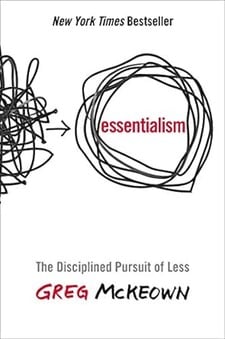
Book Overview: Essentialism is more than a time-management strategy or a productivity technique. It is a systematic discipline for discerning what is absolutely essential, then eliminating everything that is not, so we can make the highest possible contribution toward the things that really matter. By forcing us to apply more selective criteria for what is Essential, the disciplined pursuit of less empowers us to reclaim control of our own choices about where to spend our precious time and energy—instead of giving others the implicit permission to choose for us. Essentialism is not one more thing—it’s a whole new way of doing everything. It’s about doing less, but better, in every area of our lives. Essentialism is a movement whose time has come.
Read Next:
NEW In The Shop: Don’t Let The Tame Ones Tell You How To Live [Poster]
Why We ♥ It: Some of the best advice I (Matt here) ever got was: don’t take life advice from people who aren’t living a life you want to live and don’t take criticism from people you wouldn’t go to for advice. I created this poster to act as a reminder to listen more closely to our role models and less closely to our critics, trolls, and tamed-comfort-zone-hugger acquaintances. It’s also a perfect gift for the outdoor adventurer, travel enthusiast, or solo explorer (or soon to be). Available in print or digital download. 👇🏼
...Want to advertise your book, product, or service? Send inquiries to matt@movemequotes.com.
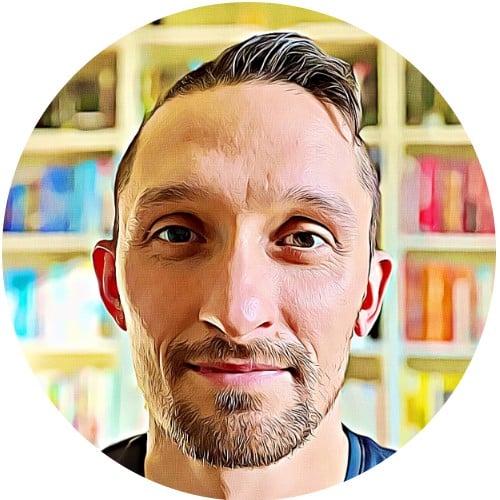
Written by Matt Hogan
Founder of MoveMe Quotes. On a mission to help busy people do inner work—for better mental health; for healing; for personal growth. Find me on Twitter / IG / Medium. I also share daily insights here. 🌱
It has taken me 1,000’s of hours to build this free library for you. If it has helped you, you can support my continued effort here. ☕️
